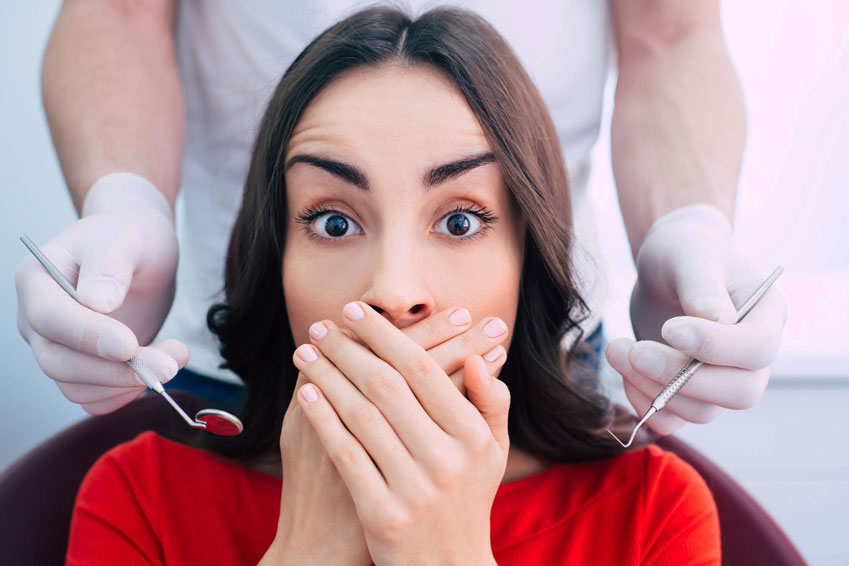If you’re a smoker, you probably are aware of the negative impact smoking has on your general health. Something else you may not know is that smoking negatively impacts your oral health.
Smoking affects a person’s oral health in many ways, and most smokers are unaware of the relationship. Let’s take a closer look at the harm caused by smoking to the mouth, teeth, gums, and throat.
 Cancer Risk
Cancer Risk
Smoking and chewing tobacco are the primary causes of oral cancer. It’s important to have regular dental checkups so that you can ensure early detection when it’s easiest to treat. Symptoms of oral cancer include red or white patches in your mouth, sores that won’t heal, lumps or thickening tissue, and difficulty chewing or swallowing.
If you experience any of these symptoms for more than a couple of weeks, see your dentist. The screening process is quick and painless — and when caught early enough, oral cancers are highly treatable.
 Periodontitis
Periodontitis
Smoking can lead to periodontitis, a bacterial infection of the gums. This infection occurs when plaque, a sticky film that contains bacteria, builds up around your teeth. Plaque forms after eating starchy or sugary foods. The bacteria in plaque release acids that eat away at your tooth enamel and irritate your gums. Periodontitis can cause:
- Tooth loss
- Gum recession (the pulling back of the gum line from your teeth)
- Bad breath (halitosis) caused by bacteria in plaque
- Tooth discoloration, including yellowing and browning of your teeth and tongue.
The chronic inflammation caused by periodontitis is also associated with oral cancer development and progression.
 Tooth discoloration
Tooth discoloration
There are a few ways that smoking causes tooth discoloration. First, tobacco can stain the protective enamel layer of your teeth.
In addition to staining your teeth directly, smoking reduces the amount of saliva in your mouth, which makes it harder to clear plaque and bacteria from the surface of your teeth. This results in yellowing and darkening of the teeth. There are several steps you can take to avoid stained teeth if you smoke:
- Seek professional whitening treatments. If stains have accumulated on your teeth, ask your dentist about ways to whiten your smile.
- Avoid certain beverages and foods that stain teeth: coffee, tea, wine, and candy are major culprits.
- Keep up with good oral hygiene habits including brushing and flossing regularly.
- Quit smoking! This is one sure-fire way to halt any further damage caused by smoking-related tooth discoloration
 Bad breath
Bad breath
Smoking leads to bad breath, and bad breath can be a sign of gum disease. Research shows that smokers have higher levels of the bacteria responsible for periodontal disease than non-smokers. And although your dentist can give you tips on how to fight halitosis (bad breath), the best solution is to quit smoking entirely.
 Leukoplakia
Leukoplakia
Leukoplakia is a condition caused by irritation from smoking tobacco. Although it usually isn’t cancerous, it can be a risk factor for oral cancer. The white patches from leukoplakia form on the gums, cheeks, and tongue. They may get worse or even develop into oral cancer if you continue to use tobacco products, but they can also shrink once you stop using them.
A dentist will remove these patches and monitor them to see if they are a sign of mouth cancer.
 Tooth loss
Tooth loss
When the jawbone starts to deteriorate from smoking, it can cause tooth loss. The body will have a difficult time repairing itself if you continue to smoke, meaning that there’s a chance you could lose your teeth in the long run. If the teeth are loose and can’t support themselves, they may fall out on their own or require extraction.
As if losing your teeth wasn’t enough of a problem, it also makes it difficult to eat food. It would be extremely stressful and inconvenient for you, as well as those around you (think of how many side-eye glances you would get at restaurants).
 Gum recession
Gum recession
Gum recession can also be caused by a combination of gum inflammation and genetics. Many people with periodontal disease are genetically predisposed to thin gum tissue or shallow healing response, even if they practice excellent oral hygiene habits. Smoking makes this worse because it increases your risk of developing periodontal disease.
The best way to prevent gum recession is to properly care for your teeth and gums at home, and see your dentist regularly for professional cleanings and exams. If you smoke, quit. Smoking causes gum recession by increasing your risk of periodontal disease. Quitting will help prevent future recession as well as stop current recession from getting worse.
 If you already have receding gums from tobacco use, it’s not too late to do something about it! Once you give up smoking, the inflammation in your mouth should begin to heal on its own. The next step is scheduling an appointment with the dentist, so they can diagnose any infected teeth that may need treatment or extraction.
If you already have receding gums from tobacco use, it’s not too late to do something about it! Once you give up smoking, the inflammation in your mouth should begin to heal on its own. The next step is scheduling an appointment with the dentist, so they can diagnose any infected teeth that may need treatment or extraction.
In some cases, you may need a deep cleaning called scaling and root planing, along with antibiotics, to treat bacterial infections in the mouth that could worsen gum recession if left unchecked. Surgery might also be necessary if there is severe damage done from years of smoking that cannot be reversed through non-surgical methods of treatment such as deep cleaning or antibiotic therapy alone.
As stated, smoking is one of the leading causes of oral cancer, which can be fatal. Studies have found that smoking and chewing tobacco increase your risk of developing oral cancer by ten times.
The Bottom Line
Hopefully, you now see the connection between smoking and bad oral health. Kicking the habit is the best way to stop the threat. Speak with us about smoking cessation!
References:
More AB, Rodrigues A, Sadhu BJ. Effects of smoking on oral health: Awareness among dental patients and their attitude towards its cessation. Indian J Dent Res. 2021 Jan-Feb;32(1):23-26. doi: 10.4103/ijdr.IJDR_711_18. PMID: 34269231.
Komar K, Glavina A, Vučićević Boras V, Verzak Ž, Brailo V. Impact of Smoking on Oral Health: Knowledge and Attitudes of Dentists and Dental Students. Acta Stomatologica Croatica. 2018;52(2):148-155. doi:10.15644/asc52/2/8.
“In the mouth, smoking zaps healthy bacteria – ScienceDaily.” 15 Feb. 2012, sciencedaily.com/releases/2012/02/120215123357.htm.



















